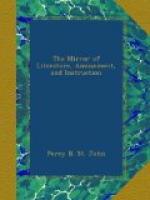Eugene Francois Vidocq is a native of Arras, where his father was a baker; and from early associations he fell into courses of excess which led to the necessity of his flying from the parental roof. After various, rapid, and unexampled events in the romance of real life, in which he was everything by turns and nothing long, he was liberated from prison, and became the principal and most active agent of police. He was made Chief of the Police de Surete under Messrs. Delavau and Franchet, and continued in that capacity from the year 1810 till 1827, during which period he extirpated the most formidable of those ruffians and villains to whom the excesses of the revolution and subsequent events had given full scope for the perpetration of the most daring robberies and inquitous excesses. Removed from employment, in which he had accumulated a handsome independence, he could not determine on leading a life of ease, for which his career of perpetual vigilance and adventure had unfitted him, and he built a paper manufactory at St. Mandee, about two leagues from Paris, where he employs from forty to fifty persons, principally, it is asserted, liberated convicts, who having passed through the term of their sentence, are cast upon society without home, shelter, or character, and would be compelled to resort to dishonest practices did not this asylum offer them its protection and afford them opportunity of earning an honest living by industrious labour. One additional point of interest in the present volume is, that the author is still living.
[We cannot follow Vidocq through his career of crime, neither would it be altogether profitable to our readers; but the links may be recapitulated in a few words. He must have been born a thief, and perhaps stole the spoon with which he was fed; but the penchant runs in the family, for Vidocq and his brother rob the same till of a fencing-room, but his brother is first detected, and sent off “in a hurry,” to a baker at Lille. Of course Vidocq soon gets partners in sin, and on the same day that he has been detected by the living evidence of two fowls which he had stolen, he sweeps from the dinner table ten forks and as many spoons, pawns them for 150 francs, spends the money in a few hours, and is imprisoned four days. He is then released; one of his pals gives a false alarm to Vidocq’s mother, and during her temporary absence, Vidocq enters his home with a false key, steals 2,000 francs from a strong chest, with which he escapes to Ostend, (intending to embark for America,) where he is decoyed by a soi-disant ship-broker, and loses all his ill-gotten wealth. He then resolves to betroth the sea, though not after the Venetian fashion, by giving her a dowry; the “sound of a trumpet” disturbs his attention, as it would of any other hero. But this proves to be the note of Paillasse, a merry-andrew. The “director,” as the opera bills would say, was Cotte-Comus, belonging to a troop of rope-dancers.




